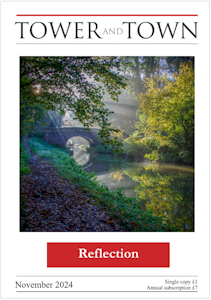

Tower and Town, November 2024 (view the full edition) (view the full edition)EqualityEquality (fairness, equity) is one of the four Quaker testimonies, the others being Simplicity, Truth, Peace. These are not ethical rules, not commandments, but principles of a better life and ways of behaving towards our fellow human. All are aspirations: in a world of lying politicians, scams, and fraud, when systematic plundering of the earth's resources has brought us all to the brink of extinctions on a huge scale, and when war continues to blight lives even in the Middle East and Europe, these simple-looking values are more needed than ever. "Dad, that's not fair." Most children have a clear concept of fairness, but as adults we live in a world of gross, obscene inequality where, in respect of wealth, the richest 1% of the population of this planet owns or benefits from or can exploit 46% of the planet's resources, assets, wealth and riches. Of course, that 1% amounts to about 75 million people, mainly male and white. There are philanthropists among them, but the majority are probably not. Here is another way of looking at global wealth distribution. After the richest 1%, with their 46% of the pie, the 11% who make up the middle classes have a slightly generous 39%, while the poor and the wretchedly poor, that's 35% of all people, scramble for 15% of the pie. That's the world: what about the UK? Here the income and wealth of the top 20% is more than that of the poorest 60%; we have child malnutrition, food banks, and gross differences in life expectancy in the world's fifth biggest economy. We are probably the most wealth-unequal country in Europe, while the USA is the most unequal world power. I have not the space or skill to explain how this came about, or why it continues; why bankers are better off after the 2008 financial crash, while ordinary folk are poorer, or how a British corporation CEO can receive £15m a year, while his workers get a small fraction of that. But Oxfam has said, "Such inequality is unsustainable, hinders poverty reduction efforts, and makes resilience to future changes more uncertain, whether from economic or environmental crises, climate change or pandemic". There is also evidence that inequality has its costs: more unequal societies imprison more of their citizens, with more violence, homicide, drug addiction, low productivity, and loss of trust. The message is that more equal societies do better than unequal ones for everyone, not just for the poor. But there are other inequalities. There is still too much male/female unfairness; class/caste differences, with, for example, 200 million untouchables in India; LGBT people still face the threat of imprisonment or murder in many countries, and racism and growing inequality between nations increases the risk of war and an inadequate response to the threat of climate change. What can we do? We can be more aware of just how lopsided our planet is, and the cost and damage it entails. We can pay our taxes, vote for a government which takes the problem seriously and try to treat our fellow man or woman fairly, regardless of sex, sexual orientation, race, class, or age. We can try. Barney Rosedale |